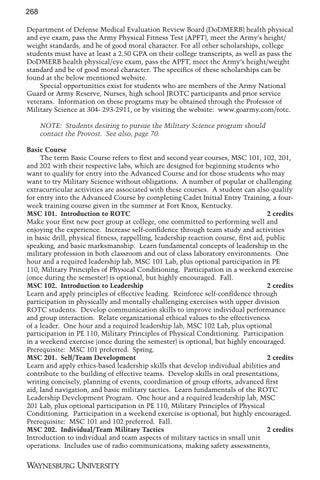268 Department of Defense Medical Evaluation Review Board (DoDMERB) health physical and eye exam, pass the Army Physical Fitness Test (APFT), meet the Army’s height/ weight standards, and be of good moral character. For all other scholarships, college students must have at least a 2.50 GPA on their college transcripts, as well as pass the DoDMERB health physical/eye exam, pass the APFT, meet the Army’s height/weight standard and be of good moral character. The specifics of these scholarships can be found at the below mentioned website. Special opportunities exist for students who are members of the Army National Guard or Army Reserve, Nurses, high school JROTC participants and prior service veterans. Information on these programs may be obtained through the Professor of Military Science at 304- 293-2911, or by visiting the website: www.goarmy.com/rotc. NOTE: Students desiring to pursue the Military Science program should contact the Provost. See also, page 70. Basic Course The term Basic Course refers to first and second year courses, MSC 101, 102, 201, and 202 with their respective labs, which are designed for beginning students who want to qualify for entry into the Advanced Course and for those students who may want to try Military Science without obligations. A number of popular or challenging extracurricular activities are associated with these courses. A student can also qualify for entry into the Advanced Course by completing Cadet Initial Entry Training, a fourweek training course given in the summer at Fort Knox, Kentucky. MSC 101. Introduction to ROTC 2 credits Make your first new peer group at college, one committed to performing well and enjoying the experience. Increase self-confidence through team study and activities in basic drill, physical fitness, rappelling, leadership reaction course, first aid, public speaking, and basic marksmanship. Learn fundamental concepts of leadership in the military profession in both classroom and out of class laboratory environments. One hour and a required leadership lab, MSC 101 Lab, plus optional participation in PE 110, Military Principles of Physical Conditioning. Participation in a weekend exercise (once during the semester) is optional, but highly encouraged. Fall. MSC 102. Introduction to Leadership 2 credits Learn and apply principles of effective leading. Reinforce self-confidence through participation in physically and mentally challenging exercises with upper division ROTC students. Develop communication skills to improve individual performance and group interaction. Relate organizational ethical values to the effectiveness of a leader. One hour and a required leadership lab, MSC 102 Lab, plus optional participation in PE 110, Military Principles of Physical Conditioning. Participation in a weekend exercise (once during the semester) is optional, but highly encouraged. Prerequisite: MSC 101 preferred. Spring. MSC 201. Self/Team Development 2 credits Learn and apply ethics-based leadership skills that develop individual abilities and contribute to the building of effective teams. Develop skills in oral presentations, writing concisely, planning of events, coordination of group efforts, advanced first aid, land navigation, and basic military tactics. Learn fundamentals of the ROTC Leadership Development Program. One hour and a required leadership lab, MSC 201 Lab, plus optional participation in PE 110, Military Principles of Physical Conditioning. Participation in a weekend exercise is optional, but highly encouraged. Prerequisite: MSC 101 and 102 preferred. Fall. MSC 202. Individual/Team Military Tactics 2 credits Introduction to individual and team aspects of military tactics in small unit operations. Includes use of radio communications, making safety assessments,
Issuu converts static files into: digital portfolios, online yearbooks, online catalogs, digital photo albums and more. Sign up and create your flipbook.
